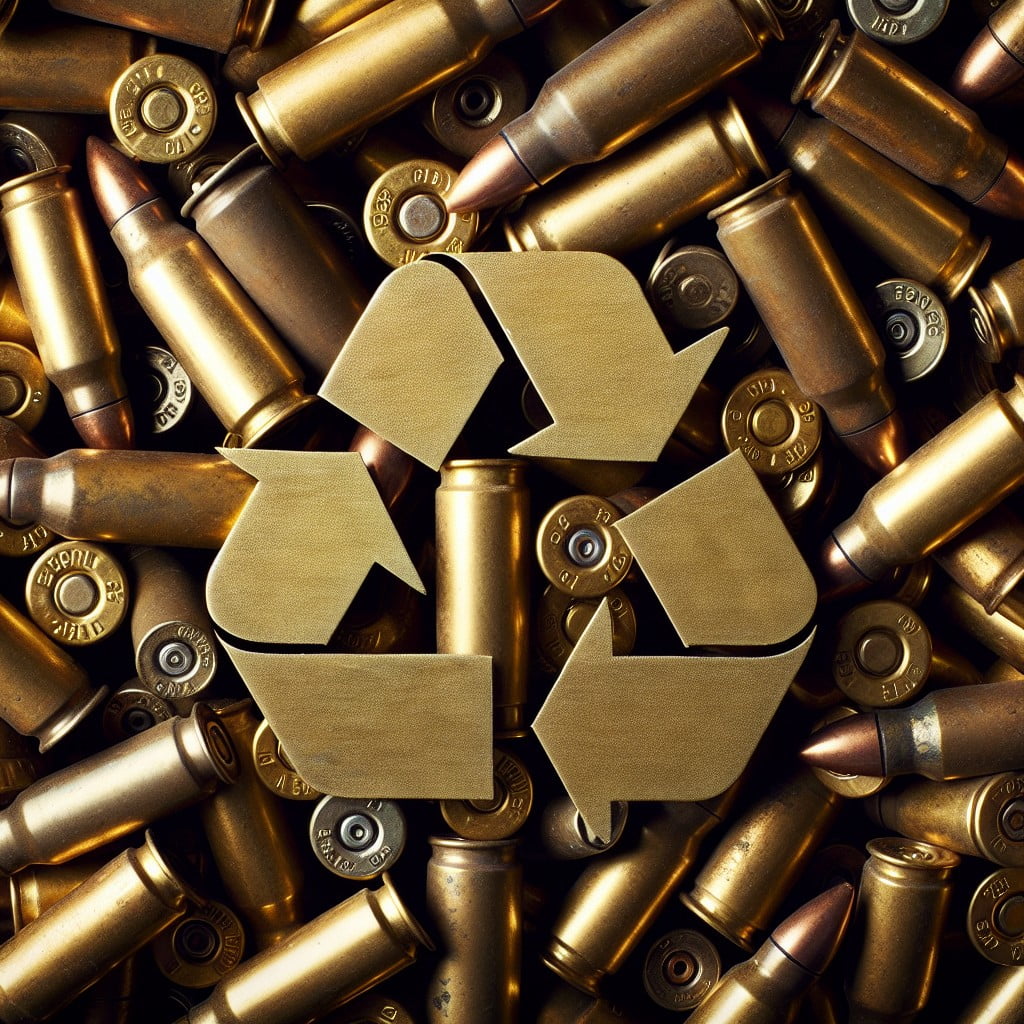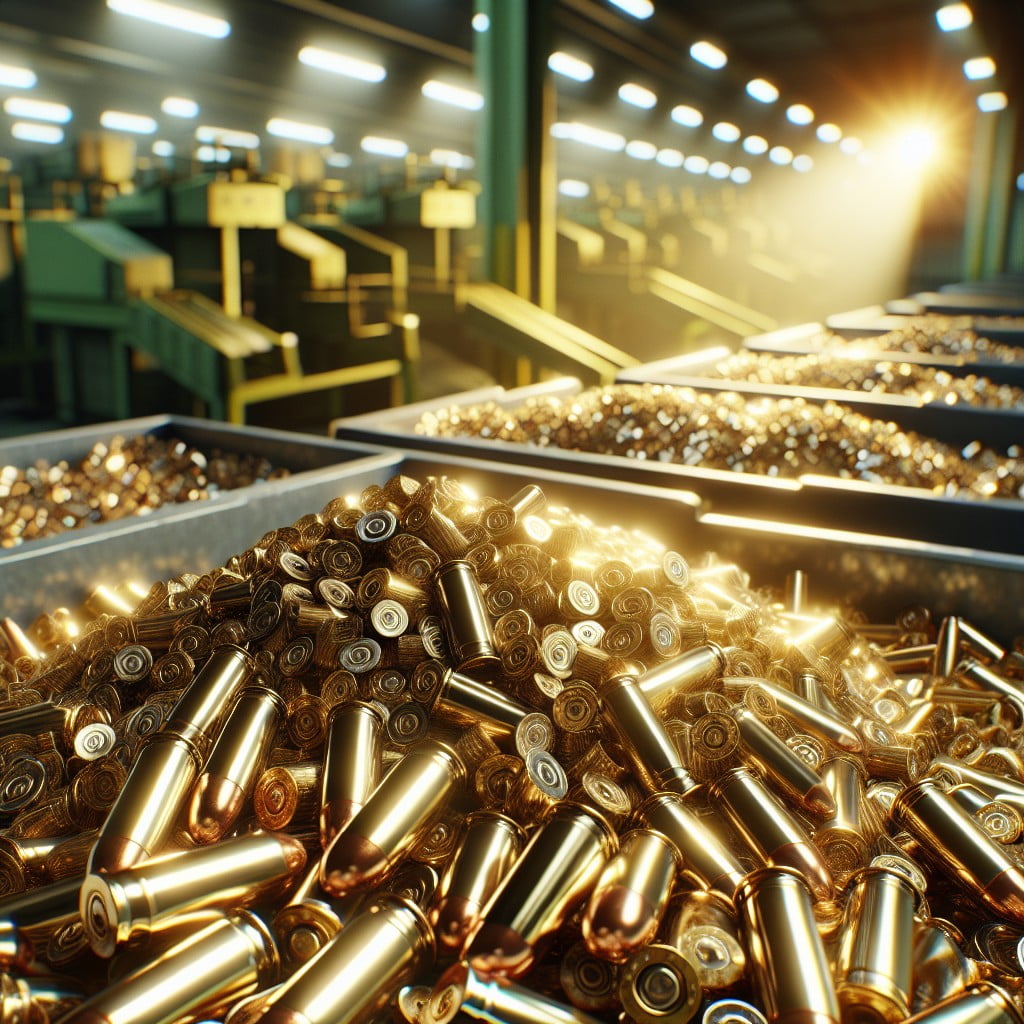Last updated on
Scrap brass shells can be safely recycled at local metal recycling facilities or scrap yards.
Key takeaways:
- Brass shells can be safely recycled at local metal recycling facilities.
- Recognize brass shells by color, magnetism, headstamp, weight, and size.
- Brass shell casings have value due to their metallic composition.
- Clean, separate, and check local regulations before recycling brass shells.
- Find local recycling centers or scrap metal yards for brass shell recycling.
The Value of Brass Shell Casings

Brass shell casings carry significant worth due to their metallic composition. It’s a sought-after metal by recyclers, and holds an enduring value in marketplaces.
Its resilience and durability, along with the ease to mold it into new forms, make it a prized scrap material. The weight of your brass casings will directly influence the amount you might receive in return from recyclers, as they typically buy by the pound.
A notable aspect of these brass shells is their reusability in reloading ammunition, further enhancing their value. Always clean and separate your brass casings from other metals to optimize the recycling yield and ensure a fair price for your scrap.
Sorting and Preparing Scrap Shells for Recycling

Prior to sending your brass shell casings for recycling, ensuring they are appropriately sorted and prepared can dramatically improve the process. Follow these steps:
1. Empty Casings: Double check to verify all shells are empty without any live round.
2. Clean Them: Soak them in a mixture of warm water and vinegar and scrub off any dirt or grime. Dry completely to prevent rust.
3. Separate by Type: Divide the casings based on their metal type. A magnet can be employed to separate brass from other metals.
4. Remove Steel Parts: Those that contain steel, such as clips or links, should be removed as these can lower the value of your brass.
5. Check Local Regulations: Prior to heading to your recycling center, check their specific requirements. Some may ask for further preparation or may have separation requirements.
By taking some time to sort and prepare your brass shell casings properly, you can ensure a smoother recycling process and potentially fetch a greater recycling return. Remember, ethical and responsible recycling is a process that helps contribute to a more eco-friendly and sustainable environment.
Find Local Recycling Centers
To locate a nearby recycling center, start by doing a simple online search. Many town or city websites contain a recycling section where you’ll find relevant details on the locations, the types of materials they handle, and their operating hours.
Online directories like Earth911 and Recycler’s World are also valuable resources containing comprehensive lists of recycling centers and services across the country.
Alternatively, reach out to your local municipality or waste disposal service. They’re typically knowledgeable about nearby facilities that specialize in brass shell recycling.
When exploring these options, be sure to clarify whether these centers handle ammo shell casings. Not all recycling centers are equipped to process this specific type of scrap brass, so clarifying this ahead of time can save unnecessary trips.
Always abide by local and state laws when recycling ammunition shells. Some municipalities may have strict regulations about transporting and recycling ammo, so it’s worth making sure you’re compliant to avoid possible legal repercussions.
Brass shells can sometimes be considered hazardous waste, meaning they should be treated differently from ordinary recyclables. A local hazardous waste facility might be a better fit for this type of material. Check their waste handling guidelines before you drop off your brass shells.
Contact Local Scrap Metal Yards
To find your local scrap metal yard, an online search is the most effective way. Input “scrap metal yards near me” into your preferred search engine. You should be able to view a comprehensive list of local options in the results.
Once you have a list, sort through their websites or make a few calls to gather further information about their processes. The important points to find out include:
- Do they accept brass shells?
- Is there a minimum weight for scrap brass they will accept?
- What sort of prices are they offering for scrap brass?
- Where is the yard located and what are their operating hours?
On initial contact, ensure to let them know clearly that you have scrap brass shells. This will prevent any confusion and they will immediately tell you their policy regarding its acceptance. Some yards may not deal with ammunition scrap, so confirming this can save time and effort.
Remember, safety comes first. When transporting brass shells or any scrap metal, ensure it’s securely packed to prevent any harm or injury.
Ammo Recycling Policies At Local Gun Ranges
Clearly communicate your intention to recycle used brass shells safely. It’s a topic that they may not deal with directly, but they should be able to provide guidance.
Next, inquire if the range participates in any ammo recycling programs. Some ranges collect spent cases, and could possibly take yours too. This can be an easy and convenient way to recycle your brass shells.
Finally, ask for any suggestions or references they might have. Even if the range doesn’t recycle ammo, they probably have contacts in the industry who can help. By doing so, you can ensure you become part of the solution for environmentally responsible ammo disposal.
Legal and Safe Practices for Disposing Live Ammo
It’s essential to note that live ammunition requires special handling due to its potentially hazardous nature. Thus, never try to disassemble cartridges yourself as it could lead to serious physical harm. Instead, turn over all live rounds to qualified professionals.
1. Consult Authorities: Contact your local police or sheriff’s department. They can often help with the disposal of live ammunition and sometimes provide this service free of charge.
2. Local Gun Shops: Reach out to these businesses, who might be willing to take live ammo off your hands or direct you to expert ammo disposal services.
3. Hazardous Waste Disposal Events: Some cities host disposal events, particularly for items that cannot be tossed in regular waste bins, including live ammunition.
4. Sporting Good Stores: Larger establishments often have procedures for disposing of unusable rounds.
Follow the advice of these experts to ensure that your unused live ammo is disposed of properly. Remember, safety is paramount when dealing with ammunition. Going the extra mile to seek professional advice could save you from potentially dangerous situations.
The Dos and Don’ts for Disposing Spent Ammo
Safe disposal of spent ammo is a process involving careful considerations, often mandated by law to prevent potential hazards.
Do:
- Always keep your spent shells in a safe, dry location until ready for disposal. Humidity or exposure to water can damage the brass, reducing its recyclability.
- Ensure the ammunition is entirely spent. Any live rounds should be handled with utmost caution and handed to professionals for disposal.
- Keep in mind local regulations. Some states and municipalities have specific rules regarding ammunition disposal, including recycling and landfill restrictions.
Don’t:
- Never throw your spent shells in general household waste. It can pose severe risks, including potential explosions.
- Refrain from burying spent ammo in your backyard. It could contaminate soil or water resources and is generally illegal.
- Avoid trying to disassemble live ammo if found alongside spent shells. Such actions pose significant safety concerns and should be left to professionals.
These steps help promote both personal safety and environmental conservation while dealing with spent ammunition.
Safety Precautions While Handling Ammo
During the process of sorting and preparing ammunition for recycling, safety should remain paramount.
1. Personal Protective Equipment(PPE): Always use gloves to guard against sharp edges and possible residue or dirt. For added safety, consider eye protection as well.
2. Secure Storage: Store ammunition in dry and cool locations away from flammable materials or fluids. Containers should provide adequate ventilation.
3. Avoid Disassembling: It’s best to avoid attempting to disassemble cartridges. The powder inside can be hazardous.
4. Dispose Live Ammunition Properly: If live ammunition is encountered, it should never be dismantled. It’s best to contact local law enforcement for guidance on safe disposal.
5. Awareness of Local Laws: Fully comprehend local regulations regarding ammunition handling to maintain compliance.
6. Maintain Distance: During transportation, try to keep the ammunition in the trunk or back of the vehicle, away from passengers.
Remember, always approach this task thoughtfully and prioritize safety above all else.
How to Earn Money By Recycling Brass Shells
Most scrap metal facilities offer payment based on the weight of the brass being recycled, with amounts varying depending on market rates. Before heading to a recycling facility, follow these steps to ensure optimal returns:
1. Clean Your Shells: Remove any dirt or residue to ensure you’re paid for brass weight alone.
2. Separate Your Metals: Brass shells mixed with other metals like steel or aluminum can reduce the overall value of your load. Always separate different metals before visiting the scrap yard.
3. Check Current Market Prices: Scrap brass rates fluctuate. Check the latest rates before selling to guarantee you’re receiving a fair deal. Many websites and apps offer up-to-date metal prices.
4. Shop Around: Don’t settle for the first price. Call multiple local facilities to find the highest offer for your scrap shells.
5. Be Prepared to Wait: Usually, recycling companies will pay on the spot for scrap metal, but at times you might have to wait for payment due to verification processes.
Remember, while earning from scrap shell recycling might not make you a millionaire, it’s income from waste while also contributing to greater environmental sustainability.
FAQ
Can brass shells be recycled?
Yes, brass shells can indeed be recycled by delivering them to a scrap metal facility or a metals recycler.
Are empty brass shells worth anything?
Yes, empty brass shells are valuable as they can typically be recycled for over a dollar per pound, depending on current market prices for brass.
Where can I sell my brass bullet shells?
Brass bullet shells can be sold to recycling centers such as Interco, which purchases and recycles scrap brass shells.
Is brass recyclable or not?
Yes, brass is recyclable and can be processed multiple times without losing its chemical or physical properties.
What are the environmental benefits of recycling brass shells?
Recycling brass shells conserves natural resources, decreases greenhouse gas emissions by reducing energy usage, and prevents substantial waste in landfills.
How is the recycling process for brass shells accomplished safely?
The recycling process for brass shells is accomplished safely by sorting and cleaning them, melting together at high temperatures, and finally reshaping the molten metal into new products.
Can other materials, apart from brass, be recovered from spent shells during recycling?
Yes, other materials such as steel, copper, and zinc can be recovered from spent shells during recycling.
Recap:




